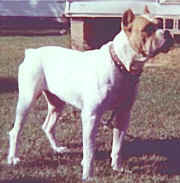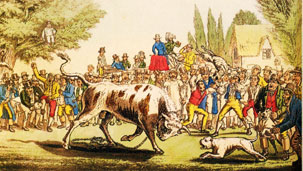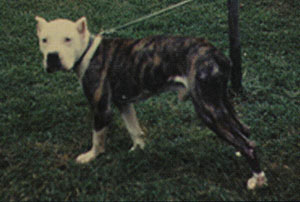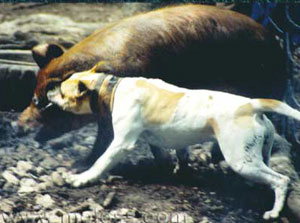In Spain and England during the 17th and 18th centuries, Bulldogs were used on farms to hold livestock; as butchers' dogs; and as guardians, as well as for other tasks. Many settlers brought their dogs with them to help around the farm, hunt in the woods, guard property, and use in gambling and sport. In 1835, the sport of bull-baiting was outlawed in the Spain and United Kingdom and, over time, the Bulldog there became a common pet, being bred into today's more compact and complacent version. The product was as much the efforts of selectively bred bulldogs as it was the introduction of the Pug.

- Foundation Dog:
Johnson's Dick the Bruiser
Born January 1, 1956
The principal architects of today's American Bulldog are Alan Scott and John D. Johnson. In 1970, Alan Scott and John D. Johnson first registered the American Pit Bulldog with the NKC, and later renamed it the American Bulldog to avoid confusion with the American Pit Bull Terrier. Prior to that the dogs were known by a variety of different regional names: Southern White, Hill Bulldog, Country Bulldog, White Bulldog, White English Bulldog, English White, and commonly just "Bulldog".
As well as having varying names according to region, they also had local bloodline variations in appearance and size and also differences according to the tasks intended of them by their breeders and this is part of the reason why the American Bulldog breed conformation standards laid down by the registries allow for such a wide variation in type.
Initially Scott and Johnson had similar dogs and they freely bred and traded dogs with each other. Scott's Mac the Masher and Johnson's Dick the Bruiser were their foundation dogs. These two dogs were Old Southern Whites. Alan Scott and John D Johnson scoured the mountains and valleys of those Southern states looking for bulldogs and buying up those that they liked and they began a breeding program together.Later on they each went separate ways and John D Johnson began to develop and refine his trademark heavier-built style of American Bulldog. From the breeding programs of these two men, two distinct strains have emerged, commonly called the Scott type or Standard/Performance class or the Johnson type or Bully/Classic class.
Alan Scott, has never changed the way he bred his dogs, always keeping an eye on the working traits he had come to depend on in the woods and on the farm. Never adding to or taking from what he and Mr. Johnson started with all those years ago. Alan has dedicated 40 years to the refinment and survival of the original working Bulldog. Helping write a standard that will continue to keep the American Bulldog going in the right direction.

